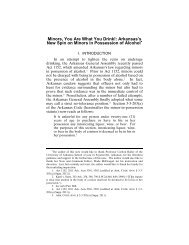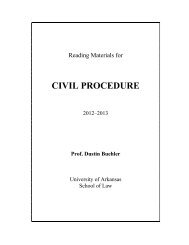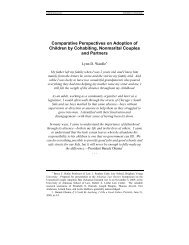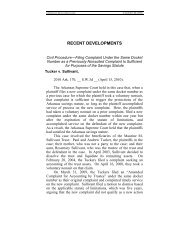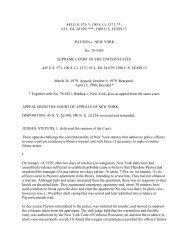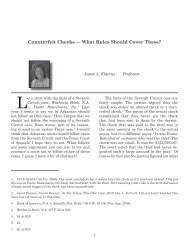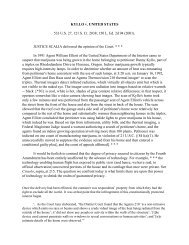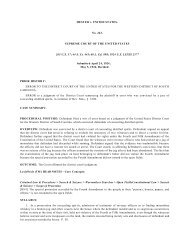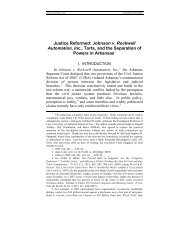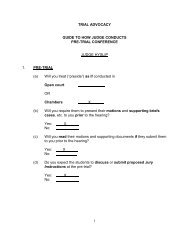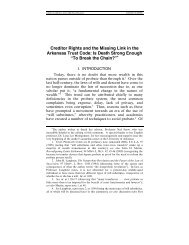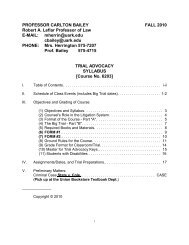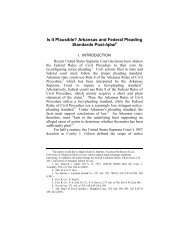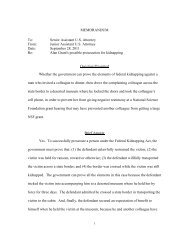Facebook Discovery and the Unbearable Sameness of Internet Law
Facebook Discovery and the Unbearable Sameness of Internet Law
Facebook Discovery and the Unbearable Sameness of Internet Law
Create successful ePaper yourself
Turn your PDF publications into a flip-book with our unique Google optimized e-Paper software.
54 ARKANSAS LAW REVIEW [Vol. 65:39<br />
a review for relevance a burden on <strong>the</strong> court, 56 but it exposes <strong>the</strong><br />
personal communications <strong>of</strong> a party to <strong>the</strong> judge, perhaps<br />
unnecessarily. Indeed, in order to resolve one discovery dispute<br />
over photographs <strong>and</strong> comments posted on <strong>Facebook</strong>, a judge in<br />
one case requested that <strong>the</strong> plaintiff <strong>and</strong> a nonparty witness<br />
accept “friend requests” from an account he had set up so that he<br />
could review <strong>the</strong> photographs. 57<br />
By far <strong>the</strong> most troubling cases, however, have been when<br />
courts have ordered parties to grant access to <strong>the</strong>ir accounts to<br />
parties requesting discovery <strong>of</strong> those accounts—that is, to<br />
provide adverse parties with <strong>the</strong> ability to roam through <strong>the</strong><br />
accounts at will, without any constraint as to what information is<br />
viewed or copied. 58 Courts have listed three reasons for<br />
granting such requests for access. First, courts have concluded<br />
that <strong>the</strong>re is likely to be relevant information in <strong>the</strong> account. 59<br />
Most <strong>of</strong> <strong>the</strong> cases involving disputes over discovery <strong>of</strong> socialnetworking<br />
sites have been personal-injury lawsuits. 60<br />
Typically it is <strong>the</strong> defendants that are seeking materials,<br />
especially photographs, from <strong>the</strong> plaintiffs’ accounts, in order to<br />
disprove allegations <strong>of</strong> serious, debilitating injury. Socialnetworking<br />
accounts are thus an appropriate target for discovery<br />
at *1. Finding “no meaningful distinction” between <strong>the</strong> two, <strong>the</strong> court allowed <strong>the</strong><br />
defendant to obtain <strong>the</strong> complete set <strong>of</strong> printouts. Id. at *1-2.<br />
56. See Collens v. City <strong>of</strong> New York, No. 03 Civ. 4477 JGK HBP, 2004 WL<br />
1395228, at *2 (S.D.N.Y. June 22, 2004) (“It is well-settled that in camera review <strong>of</strong><br />
documents by <strong>the</strong> Court is <strong>the</strong> exception <strong>and</strong> not <strong>the</strong> rule because <strong>of</strong> <strong>the</strong> enormous strain it<br />
places on <strong>the</strong> resources <strong>of</strong> federal trial courts. Such review is ordinarily utilized only when<br />
necessary to resolve disputes concerning privilege; it is rarely used to determine<br />
relevance.”) (internal citations omitted).<br />
57. Barnes, 2010 WL 2265668, at *1.<br />
58. See Romano v. Steelcase Inc., 907 N.Y.S.2d 650, 657 (Sup. Ct. 2010); Largent v.<br />
Reed, No. 2009-1823, 2011 WL 5632688 (Pa. Ct. C.P. Nov. 8, 2011); Zimmerman v. Weis<br />
Markets, Inc., No. CV-09-1535, 2011 WL 2065410 (Pa. Ct. C.P. May 19, 2011); McMillen<br />
v. Hummingbird Speedway, Inc., No. 113-2010 CD, 2010 WL 4403285 (Pa. Ct. C.P. Sept.<br />
9, 2010).<br />
59. See cases cited supra Part III.A.<br />
60. There are a wide variety <strong>of</strong> o<strong>the</strong>r contexts in which such information might be<br />
relevant, however, such as divorce actions. See Kashmir Hill, Judge Orders Divorcing<br />
Couple to Swap <strong>Facebook</strong> <strong>and</strong> Dating Site Passwords, FORBES.COM (Nov. 7, 2011, 10:42<br />
AM), http:// www.forbes.com/sites/kashmirhill/2011/11/07/judge-orders-divorcing-coupleto-swap-facebook-<strong>and</strong>-dating-site-passwords/<br />
(discussing <strong>the</strong> Connecticut divorce case <strong>of</strong><br />
Stephen <strong>and</strong> Courtney Gallion). Information from social-network sites has also been<br />
relevant in employment-discrimination cases. See E.E.O.C. v. Simply Storage Mgmt., 270<br />
F.R.D. 430, 432 (S.D. Ind. 2010); Ledbetter v. Wal-Mart Stores, Inc., No. 06-cv-01958-<br />
WYD-MJW, 2009 WL 1067018, at *2 (D. Colo. Apr. 21, 2009).



